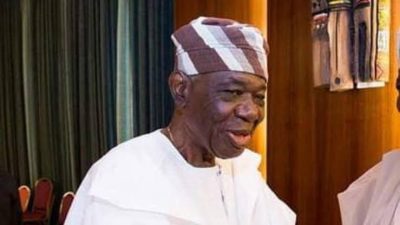OBITUARY: Ernest Shonekan, the technocrat who ‘stabilised’ Nigeria after June 12 annulment
A glance at the short but illustrious gallery of Nigeria’s leaders will show leaders in military regalia, alongside a handful of men in starched traditional attire. But right at the centre of these two sets of leaders is solemn-looking Shonekan, who held power, albeit briefly, after Ibrahim Babangida, former head of state, “stepped aside” after the June 12 annulment.
Shonekan died on Tuesday at the age of 85 and with the tributes that have continued to pour in in his honour, his short stint at the helm of the country’s affairs leads the conversations around what many term a well-lived life.
Beyond his transient regime as Nigeria’s interim head of state, Shonekan was a British-trained lawyer and industrialist who headed vast Nigerian conglomerates. He founded the Nigerian Economic Summit Group (NESG), a private sector-led think-tank and policy advocacy group that promotes sustainable growth and the development of the economy.
FROM LAGOS TO BRITAIN
Shonekan was born on May 9, 1936, in Lagos to a civil servant father who originated from Abeokuta. He got his earlier education at the CMS Grammar School and Igbobi College before getting a law degree from the University of London. He later attended the Harvard Business School.
In 1964, Shonekan was employed by the United Africa Company of Nigeria, at the time a subsidiary of the United Africa Company, which had a reputation dating back to the British colonial days. A quick rise through the ranks saw him land a place on the board of directors at the age of 40. He was made chairman and managing director in 1980. He was given the title of Abese of Egbaland in 1981.
ROLE IN JUNE 12 CRISIS
On January 2, 1993, Babangida appointed Shonekan as the head of the transitional council that was created to be the initial stage of the military regime’s eventual handover to a civilian government that should have emerged from the presidential election later that year.
However, June 12, 1993 came and the election rolled by and Babangida annulled the results after Moshood Abiola of the Social Democratic Party (SDP) was said to have taken a significant lead over his opponent, Bashir Tofa of the National Republican Convention (NRC). A crisis ensued with Abiola and his supporters pushing for a declaration of victory.
Babangida, instead, stepped aside on August 27, 1993, but not before he signed a decree establishing the interim national government, which saw Shonekan become the interim head of state.
EIGHTY-THREE DAYS IN OFFICE
Shonekan became the Nigerian head of state with the shortest term in office after he was ousted by Sani Abacha, his defence minister, on November 17, 1993. He spent just 83 days as the head of the Nigerian government. His interim government was, however, largely unpopular with the people despite naming Abiola as his vice-president.
Under his brief leadership, the strident economic policies of his predecessor began degrading, which many have linked to the uncertain political terrain following the June 12 annulment.
Before settling and building a structure to create impact, he was deposed in a coup headed by Abacha.
Delivering his resignation address on November 17, 1993, Shonekan said the national government under his watch “tried very hard to bring honour to government” and took steps to tackle corruption and indiscipline.
Meanwhile, days before his resignation, on November 10, 1993, a high court ruled that the interim government was “illegal” on the basis that Shonekan’s appointment was signed after Babangida “stepped aside”.
OUT OF OFFICE AND INTO NESG
After leaving office in 1993, with the private sector connections he built in his years at UAC, he founded the Nigerian Economic Summit Group (NESG).
The private sector think-tank has worked with the Nigeria Governors’ Forum (NGF) to help promote economic cooperation between sub-nationals and businesses in the quest to create jobs.
In 2019, the group signed a Memorandum of Understanding with the National Universities Commission (NUC) for an academia-industry collaboration to revitalise Nigeria’s higher education system.
THE NATIONALIST WHO BELIEVED YOUTHS CAN TRANSFORM NIGERIA
Aside from other positions he has held, including as chairman of the Infrastructure Concession Regulatory Commission (ICRC), Shonekan has not minced words about his belief in Nigeria’s potential for greatness.
Speaking during the Democracy Day celebration in May 2014, he had expressed optimism about Nigeria’s “bright future”, which he believed could be achieved by promoting peace and supporting the youth population.
“I believe that the future will be bright if there is peace. Without peace, there can’t be any progress in the country. So, we need to have peace in the country. And if we have to have peace, each of us must contribute our quota towards it,” he had said.
“So, I appeal to everybody that they should sheathe their swords and let’s concentrate on growing the economy further and create jobs for the teeming population.
“I’m glad that we’re thinking in terms of the youths because the youths constitute about 50 percent of the total population at the moment — that’s a lot.
“So, we have to create jobs; we have to make them happy. If we’re able to get each of them them to do a little bit to contribute to the economy, this country will be a better place and it will be very difficult for any country to beat Nigeria.”
From past leaders to lawmakers and political stakeholders, one message cuts across board on how Shonekan will be remembered — stability.
While President Muhammadu Buhari described Shonekan as “a peacemaker” who steered Nigeria through “a delicate time when the country needed someone of his calm mien and pedigree to save the ship of state from sinking”, for former President Goodluck Jonathan, he was “a bridge builder who stepped in to lead at a very difficult time”.


